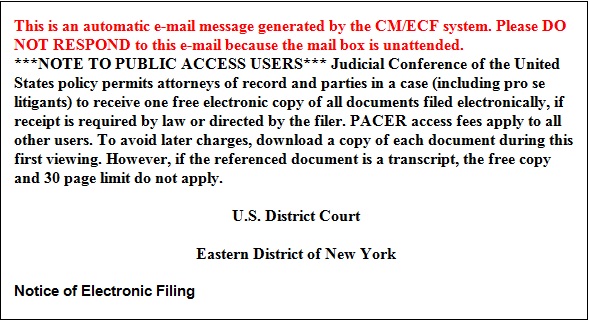Forty Million Reasons to Read Attachments, Not Just Court Email Notices
April 21, 2015
News and Views on Environmental & Toxic Tort Federal and State Legal Issues and Developments
April 21, 2015
 The failure of a single lawyer to read a court order on the ECF docket can result in tragedy. However, when eighteen lawyers are emailed an ECF notification from the court and no one reads the attached documents, it becomes a tragicomedy.
The failure of a single lawyer to read a court order on the ECF docket can result in tragedy. However, when eighteen lawyers are emailed an ECF notification from the court and no one reads the attached documents, it becomes a tragicomedy.
In a recent high-profile case in the Western District of Texas, Two-Way Media won a $40 million infringement suit against AT&T. However, things went from bad to worse for the telecom giant when its attorneys — all 18 of them across two different firms — failed to timely file an appeal. It is a rough lesson for AT&T’s counsel but a valuable refresher for all attorneys: read every document received from the court; do not simply rely on the ECF clerk’s summary appended to the email.
Prior to the entry of final judgment in the infringement case, AT&T submitted four motions for renewed judgment as a matter of law (“JMOL”) or a new trial and moved to file three of the JMOL motions under seal. The district court granted the three sealing motions but, critically, denied all four JMOL motions, starting the clock on AT&T’s time to appeal. The court’s orders denying the lone non-sealed JMOL motion and granting the plaintiff’s request for costs were correctly docketed and included in the electronic case file notices (“ECF notices”) sent to both parties. However, the ECF notices referred only to the sealing motions, not the orders denying the sealed JMOL motions. Upon receipt of the mislabeled notices, AT&T’s counsel neglected to read the underlying orders — even though assistants at both firms downloaded and filed copies to internal networks. AT&T and its counsel remained unaware of the closing appeals window, only discovering their mistake long after the deadline had passed.
AT&T’s motion to extend or reopen the appeal period pursuant to Federal Rules of Appellate Procedure 4(a)(5) and (6) was denied by the district court, a decision affirmed last month by the U.S. Court of Appeals for the Federal Circuit. The appeals court agreed with the trial court’s conclusion “that it is the responsibility of every attorney to read the substance of each order received from the court and that it is not sufficient to rely on the email notifications received from the electronic filing system.” The court cited In re Morrow, 502 F.2d 520, 522 (5th Cir. 1974) (“Notification by the clerk is merely for the convenience of the litigants.”); Latham v. Wells Fargo Bank, N.A., 987 F.2d 1199, 1201 (5th Cir. 1993) (“[P]arties have a duty to inquire periodically into the status of their litigation.”); and Khor Chin Lim v. Courtcall Inc., 683 F.3d 378, 381 (7th Cir. 2012) (“The judiciary is not entitled to add time just because a litigant fails to open or read his mail”). Looking past the fact that AT&T hadn’t even “bothered to check the docket, as it should have done,” the properly docketed order granting costs “was a clear indication that all matters relevant to the question of whether [Two-Way Media] was a prevailing party had been resolved” and that the appeals clock had started.
Even the dissenting opinion failed to offer much in the way of comfort for AT&T’s mistake. Most of Circuit Judge Dyk’s dissent focused on his contention that the appeal clock began upon docketing of the correct entries, which occurred a mere three days after the incomplete ECF notices were sent out. As the majority pointed out, “AT&T’s appeal was untimely by a large margin,” and a quibble over three days is inconsequential.
The shift to electronic court notices has streamlined the process of providing litigants timely access to important documents and judicial notifications. But this case is a reminder that courts’ email notifications may not be accurate. Counsel should periodically check the docket for cases, and should ensure that someone in their office reads attachments to court emails. Unless counsel makes every effort to monitor the status of an active litigation, clients will suffer the consequences.